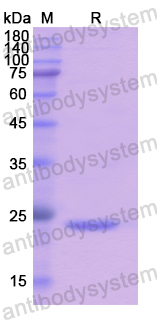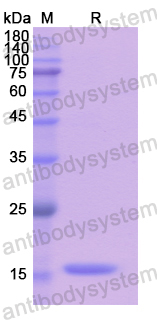Catalog No.
YHB31001
Expression system
E. coli
Species
Homo sapiens (Human)
Protein length
Asp153-Asp336
Predicted molecular weight
24.22 kDa
Nature
Recombinant
Endotoxin level
Please contact with the lab for this information.
Purity
>90% as determined by SDS-PAGE.
Accession
O75794
Applications
ELISA, Immunogen, SDS-PAGE, WB, Bioactivity testing in progress
Form
Lyophilized
Storage buffer
Lyophilized from a solution in PBS pH 7.4, 0.02% NLS, 1mM EDTA, 4% Trehalose, 1% Mannitol.
Reconstitution
Reconstitute in sterile water for a stock solution. A copy of datasheet will be provided with the products, please refer to it for details.
Shipping
In general, proteins are provided as lyophilized powder/frozen liquid. They are shipped out with dry ice/blue ice unless customers require otherwise.
Stability and Storage
Use a manual defrost freezer and avoid repeated freeze thaw cycles. Store at 2 to 8°C for frequent use. Store at -20 to -80°C for twelve months from the date of receipt.
Alternative Names
Protein D123, D123, Cell division cycle protein 123 homolog, HT-1080, C10orf7, PZ32, CDC123
CDC123 promotes Hepatocellular Carcinoma malignant progression by regulating CDKAL1., PMID:38237400
Longitudinal genomic analyses of automatically-recorded vaginal temperature in lactating sows under heat stress conditions based on random regression models., PMID:38129768
Novel disulfidptosis-derived gene blueprint stratifying patients with breast cancer., PMID:38050844
Binding of human Cdc123 to eIF2γ., PMID:37507029
USP9X deubiquitinates and stabilizes CDC123 to promote breast carcinogenesis through regulating cell cycle., PMID:37314216
After the trap snaps in the plant immune response., PMID:36893728
Global translational induction during NLR-mediated immunity in plants is dynamically regulated by CDC123, an ATP-sensitive protein., PMID:36801014
Thermofluor-Based Analysis of Protein Integrity and Ligand Interactions., PMID:35796993
Stepwise assembly of the eukaryotic translation initiation factor 2 complex., PMID:35031321
Genome-wide identification of m6A-associated functional SNPs as potential functional variants for thyroid cancer., PMID:34873468
Investigation of the Association between 45 Tag SNPs and Type 2 Diabetes Mellitus in Han Chinese Adults: A Prospective Cohort Study., PMID:33706321
The First Genome-Wide Association Study for Type 2 Diabetes in Youth: The Progress in Diabetes Genetics in Youth (ProDiGY) Consortium., PMID:33479058
Differential cell persistence is observed in the Arabidopsis female gametophyte during heat stress., PMID:32405809
Molecular Signatures of Neuroinflammation Induced by αSynuclein Aggregates in Microglial Cells., PMID:32082315
Suppression of MEHMO Syndrome Mutation in eIF2 by Small Molecule ISRIB., PMID:31836389
Histone demethylase KDM3B regulates the transcriptional network of cell-cycle genes in hepatocarcinoma HepG2 cells., PMID:30514438
Integration of human pancreatic islet genomic data refines regulatory mechanisms at Type 2 Diabetes susceptibility loci., PMID:29412141
CDC123/CAMK1D gene rs12779790 polymorphism and rs10811661 polymorphism upstream of the CDKN2A/2B gene in women with gestational diabetes., PMID:28079868
Genes associated with polymorphic variants predicting lung function are differentially expressed during human lung development., PMID:27473260
The Association of Type 2 Diabetes Loci Identified in Genome-Wide Association Studies with Metabolic Syndrome and Its Components in a Chinese Population with Type 2 Diabetes., PMID:26599349
Cdc123, a Cell Cycle Regulator Needed for eIF2 Assembly, Is an ATP-Grasp Protein with Unique Features., PMID:26211610
The eukaryotic translation initiation regulator CDC123 defines a divergent clade of ATP-grasp enzymes with a predicted role in novel protein modifications., PMID:25976611
Diabetes susceptibility in Mayas: Evidence for the involvement of polymorphisms in HHEX, HNF4α, KCNJ11, PPARγ, CDKN2A/2B, SLC30A8, CDC123/CAMK1D, TCF7L2, ABCA1 and SLC16A11 genes., PMID:25839936
Identification of a regulatory variant that binds FOXA1 and FOXA2 at the CDC123/CAMK1D type 2 diabetes GWAS locus., PMID:25211022
Genetic susceptibility for ischemic infarction and arteriolosclerosis based on neuropathologic evaluations., PMID:24135527
Translation initiation requires cell division cycle 123 (Cdc123) to facilitate biogenesis of the eukaryotic initiation factor 2 (eIF2)., PMID:23775072
Gene expression profile of a newly established choriocarcinoma cell line, iC3-1, compared to existing choriocarcinoma cell lines and normal placenta., PMID:23199791
A genome-wide association study identifies GRK5 and RASGRP1 as type 2 diabetes loci in Chinese Hans., PMID:22961080
Contribution of common genetic variation to the risk of type 2 diabetes in the Mexican Mestizo population., PMID:22923468
Genetic variants at CDC123/CAMK1D and SPRY2 are associated with susceptibility to type 2 diabetes in the Japanese population., PMID:21909839
Association of indices of liver and adipocyte insulin resistance with 19 confirmed susceptibility loci for type 2 diabetes in 6,733 non-diabetic Finnish men., PMID:21153532
Variations in/nearby genes coding for JAZF1, TSPAN8/LGR5 and HHEX-IDE and risk of type 2 diabetes in Han Chinese., PMID:20927120
Examination of all type 2 diabetes GWAS loci reveals HHEX-IDE as a locus influencing pediatric BMI., PMID:19933996
Gene variants in the novel type 2 diabetes loci CDC123/CAMK1D, THADA, ADAMTS9, BCL11A, and MTNR1B affect different aspects of pancreatic beta-cell function., PMID:19833888
Variant near ADAMTS9 known to associate with type 2 diabetes is related to insulin resistance in offspring of type 2 diabetes patients--EUGENE2 study., PMID:19789630
Lack of significant effects of the type 2 diabetes susceptibility loci JAZF1, CDC123/CAMK1D, NOTCH2, ADAMTS9, THADA, and TSPAN8/LGR5 on diabetes and quantitative metabolic traits., PMID:19670153
Association of 18 confirmed susceptibility loci for type 2 diabetes with indices of insulin release, proinsulin conversion, and insulin sensitivity in 5,327 nondiabetic Finnish men., PMID:19502414
Replication study for the association of new meta-analysis-derived risk loci with susceptibility to type 2 diabetes in 6,244 Japanese individuals., PMID:19455301
Testing the association of novel meta-analysis-derived diabetes risk genes with type II diabetes and related metabolic traits in Asian Indian Sikhs., PMID:19247373
FHA-RING ubiquitin ligases in cell division cycle control., PMID:18597043
Association testing of novel type 2 diabetes risk alleles in the JAZF1, CDC123/CAMK1D, TSPAN8, THADA, ADAMTS9, and NOTCH2 loci with insulin release, insulin sensitivity, and obesity in a population-based sample of 4,516 glucose-tolerant middle-aged Danes., PMID:18567820
Integrated profiling of basal and luminal breast cancers., PMID:18089785
Cdc123 and checkpoint forkhead associated with RING proteins control the cell cycle by controlling eIF2gamma abundance., PMID:15319434
Reversion of temperature-sensitive mutation by inhibition of proteasome-mediated degradation of mutated D123 protein., PMID:11699637
Extensive degradation of mutant-type D123 protein is responsible for temperature-sensitive proliferation inhibition in 3Y1tsD123 cells., PMID:10698258
Expression study on D123 gene product: evidence for high positivity in testis., PMID:9683532
An amino acid change in novel protein D123 is responsible for temperature-sensitive G1-phase arrest in a mutant of rat fibroblast line 3Y1., PMID:8601400



